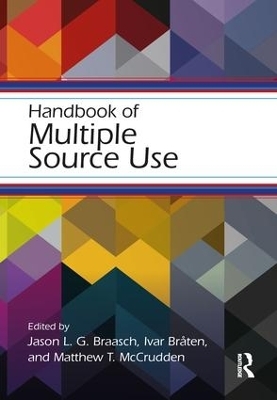
Handbook of Multiple Source Use
Routledge (Verlag)
978-1-138-64660-5 (ISBN)
Jason L. G. Braasch is Assistant Professor of Psychology and Affiliate of the Institute for Intelligent Systems at the University of Memphis, USA. Ivar Bråten is Professor of Educational Psychology at the University of Oslo, Norway. Matthew T. McCrudden is Associate Professor of Educational Psychology at Victoria University of Wellington, New Zealand.
Chapter 1. Introduction to research on multiple source use (Jason L. G. Braasch, Ivar Bråten, Matthew T. McCrudden) Section 1. Theoretical Frameworks Chapter 2. Representations and processes in multiple source use (M. Anne Britt, Jean-François Rouet, and Amanda Durik) Chapter 3. Cold and warm perspectives on the Cognitive Affective Engagement Model of multiple source use (Alexandra List and Patricia A. Alexander) Chapter 4. Towards a New Literacies perspective of synthesis: Multiple source meaning construction (Douglas K. Hartman, Michelle S. Hagerman, and Donald J. Leu) Chapter 5. A social psychology perspective on multiple source use: Elaboration and persuasion (Duane T. Wegener, Kathleen M. Patton, and Curtis P. Haugtvedt) Section 2. Individual Differences, Cognitive Mechanisms, and Contextual Factors in Multiple Source Use Chapter 6. Individual differences in multiple document comprehension (Sarit Barzilai and Helge I. Strømsø) Chapter 7. Potential challenges of Internet use among readers with dyslexia (Øistein Anmarkrud, Eva Wennås Brante, and Anette Andresen) Chapter 8. Strategic processing in accessing, comprehending, and using multiple sources online (Byeong-Young Cho, Peter Afflerbach, and Hyeju Han)Chapter 9. The role of validation in multiple documents comprehension (Tobias Richter and Johanna Maier) Chapter 10. Text relevance and multiple source use (Matthew T. McCrudden) Chapter 11. The role of conflict in multiple source use (Ivar Bråten and Jason L. G. Braasch) Section 3. Multiple Source Use in Specific Content Areas Chapter 12. Multiple source use in history (Emily Fox and Liliana Maggioni) Chapter 13. Functional scientific literacy: Disciplinary literacy meets multiple source use (Iris Tabak) Chapter 14. The role of sourcing in mathematics (Keith Weber) Chapter 15. Multiple source use when reading and writing in literature/language arts in classroom contexts (David Bloome, Minjeong Kim, Huili Hong, and John Brady) Section 4. Multiple Source Use Beyond the Classroom (section editor: Matt) Chapter 16. The provenance of certainty: Multiple source use and the public engagement with science (Rainer Bromme, Marc Stadtler, Lisa Scharrer) Chapter 17. Non-academic multiple source use on the Internet (Ladislao Salmerón, Yvonne Kammerer, and Pablo Delgado) Chapter 18. Updating of character information when reading multiple sources for pleasure (Amalia M Donovan and David N. Rapp) Chapter 19. Self-regulated learning processes and multiple source use in and out of school (Jeffrey A. Greene, Dana Z. Copeland, Victor M. Deekins, and Rebekah Freed) Section 5. Multiple Source Use Interventions (section editor: Ivar) Chapter 20. Effects of instructional conditions on comprehension from multiple sources in history and science (Jennifer Wiley, Allison J. Jaeger, and Thomas D. Griffin) Chapter 21. Learning to read while reading to learn: The central role of multiple documents in two instructional programs (Lowry Hemphill and Catherine Snow) Chapter 22. Promoting multiple text comprehension through motivation in the classroom (John T. Guthrie) Chapter 23. Instruction to promote information-problem solving on the Internet in primary and secondary education students: A systematic literature review (Saskia Brand-Gruwel and Johan L. H. van Strien) Section 6. Assessment of Multiple Source Use (section editor: Ivar) Chapter 24. Complementary methods for assessing online processing of multiple sources (Lucia Mason and Elena Florit) Chapter 25. Scenario-based assessment of multiple source use (John Sabatini, Tenaha O’Reilly, Zuowei Wang, and Kelsey Dreier) Chapter 26. Assessment of multiple resource comprehension and information problem solving (Susan R. Goldman, Alyssa Blair, and Candice M. Burkett) Chapter 27. Assessing online collaborative inquiry and social deliberation skills as learners navigate multiple sources and perspectives (Julie Coiro, Jesse R. Sparks, and Jonna M. Kulikowich) Chapter 28. Computer-based assessment of essays based on multiple documents: Evaluating the use of sources (Joseph P. Magliano, Peter M. Hastings, Kristopher Kopp, Dylan Blaum, and Simon Hughes) Chapter 29. Reflections and future directions (Jason L. G. Braasch, Matthew T. McCrudden, and Ivar Bråten)
| Erscheinungsdatum | 24.02.2018 |
|---|---|
| Reihe/Serie | Educational Psychology Handbook |
| Zusatzinfo | 12 Tables, black and white; 6 Line drawings, black and white; 3 Halftones, black and white |
| Verlagsort | London |
| Sprache | englisch |
| Maße | 178 x 254 mm |
| Gewicht | 997 g |
| Themenwelt | Geisteswissenschaften ► Psychologie ► Pädagogische Psychologie |
| Sozialwissenschaften ► Pädagogik ► Allgemeines / Lexika | |
| Sozialwissenschaften ► Pädagogik ► Bildungstheorie | |
| Sozialwissenschaften ► Pädagogik ► Erwachsenenbildung | |
| ISBN-10 | 1-138-64660-1 / 1138646601 |
| ISBN-13 | 978-1-138-64660-5 / 9781138646605 |
| Zustand | Neuware |
| Haben Sie eine Frage zum Produkt? |
aus dem Bereich


